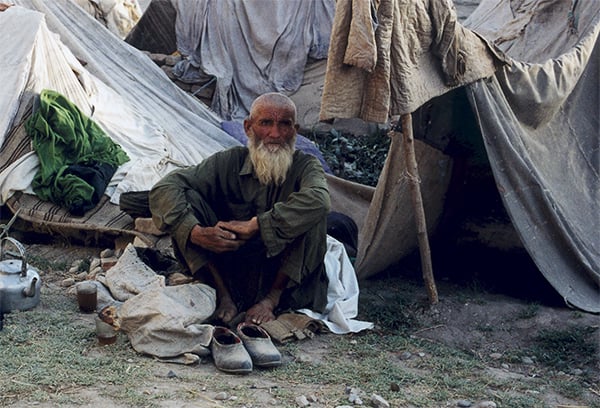Unto Leaders Talk About the Needs of People Around the World
By Amanda DeWitt

Global suffering continues to intensify, and the number of people in need of humanitarian aid continues to rise.
Humanitarian experts predict that in 2022, 274 million people will require humanitarian assistance.
With so much going on in our world, Unto leaders — Al Goff, President and CEO, and Brad Supple, Vice President of Field Operations — answer important questions about the state of humanitarian work and how each of us can make a difference.
Unto: How would you summarize the humanitarian situations facing people in the world today?
Al: In a word — relentless. COVID-19 continues to cause unprecedented suffering. But what you may not know is that there have been massive locust plagues in places like Central Asia, South America, and Africa that have destroyed the livelihood and food supply of millions.
Typhoons, hurricanes, and tornadoes have caused unimaginable devastation. People’s lives have been upended by wars and political instability. And that is on top of the growing state of food insecurity in the world.
It has been one relentless wave of suffering after another — and those who were already struggling have been impacted most.
Unto: In times like these how do you adapt strategies to best meet people’s most critical needs?
Brad: We have had to pivot in so many ways over the past couple of years. Here are just a couple of examples.
In Southeast Asia our local staff members were already working on clean water projects. When flooding from typhoons left people’s homes submerged under water, our staff members used the water filters and other critical aid they had on hand to meet immediate needs and help protect people from deadly waterborne diseases.
As a result of experiencing kindness, a woman responded to the message of hope in Jesus. She was the first known person in her village to come to faith.
In South America we had agricultural training sessions planned, but COVID-19 restrictions prevented in-person events. So we moved to virtual trainings.
Our in-country staff teams used the information from the virtual sessions to help teach people in their communities how to grow rooftop micro gardens. With local markets shutdown due to COVID-19, people no longer had access to fruits and vegetables. The micro gardens allowed people to quickly grow a nutritious source of food when no other options were available.
Unto: What will be the biggest challenges for humanitarian work in the upcoming year?
Brad: There is so much going on in our world right now. If I had to summarize the challenges we are facing, I would focus on three main issues.
- COVID-19 continues to impact the developing world. It hampers economies. It affects people’s ability to work and support themselves and their families. It has overburdened healthcare systems and prevented individuals from receiving the treatment and care they need.
- The global economy, inflation, and supply chain issues have led to a rise in the costs of goods, services, fuel, and other commodities. That makes it more difficult to serve our international partners as humanitarian items now cost more. These issues also create additional challenges when trying to ship aid and quickly get supplies into places where people need immediate assistance.
- International conflicts and crises in places like Eastern Europe, Southeast Asia, and West Africa have left even more people in need of humanitarian assistance. Humanitarian organizations must make difficult decisions about prioritizing their responses. We also face additional challenges in accessing those who are suffering and in serving those who are now displaced.
Unto: With so much going in the world, turning on the news can feel overwhelming. What can we really do to help?
Al: That is where the good news comes in. Unto® is uniquely positioned as a ministry of Cru® — we are part of the largest parachurch organization in the world with staff members serving in over 190 countries.
Our extensive network of staff teams, many of whom are indigenous, are strategically positioned and mobilized to serve. They are trained in how to share the hope of Jesus and in discipleship. They have built relationships with community leaders and are standing by to help.
What they need from us are resources and coaching. They need the humanitarian aid to help meet tangible needs and the guidance to distribute supplies efficiently.
They are meeting needs in real time. They do it in culturally appropriate ways. They are building relationships, following up over the long term, and sharing about the eternal hope of Jesus when the time is right.
Provide Survival Kits to People in the Toughest Places
Global suffering continues to intensify. The number of people in need of humanitarian assistance has risen dramatically over the past year. People in the toughest places continue to struggle due to COVID-19, famine, economic shocks, conflicts, and many other factors. Families lack access to the food, clean water, and basic items they need just to survive. Every $35 provides a Survival Kit packed with lifesaving items — and shares the hope of Jesus.
Published March 29, 2022

Amanda is a freelance writer whose work has appeared in Gift for Leadership, Kindred Spirit, and Christianity Today publications. She holds a M.A. in Media and Communication from Dallas Theological Seminary.





